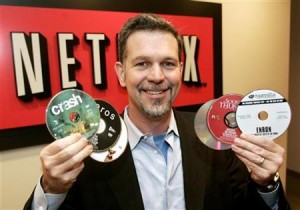http://www.businessweek.com/technology/netflix-hastings-get-it-right-09222011.html
 Many Netflix users are in outrage. In early September the company announced it would be separating its DVD delivery and streaming service into two different companies. If users who used both services continue to do so, they will now be paying almost double what they were before. Subscribers who used only one of the services will now pay almost the exact same if not less.
Many Netflix users are in outrage. In early September the company announced it would be separating its DVD delivery and streaming service into two different companies. If users who used both services continue to do so, they will now be paying almost double what they were before. Subscribers who used only one of the services will now pay almost the exact same if not less.
Deciding whether this is a good business decision or not is difficult. In the short run it appears that Netflix CEO Reed Hastings has made a grave error. The Netflix stock plummeted 19%, and the company has had to decrease their projection of users from 25 million to 24. This has majorly affected their public image, and has left many subscribers with a feeling of distrust and alienation.
In the long run I completely agree with Roger Ebert. The DVD delivery service is quickly going the way of video rental stores and becoming obsolete. Streaming is simply the way of the future because it can be used globally and is instantaneous. I do however think that Netflix should have waited longer before making this decision. Over time they will increase their leverage over firms that release licensing to stream movies, which will allow Netflix to grow their streaming library. If they had waited until consumer preferences had majorly shifted towards streaming, then they possibly could have avoided their recent fall from grace.

